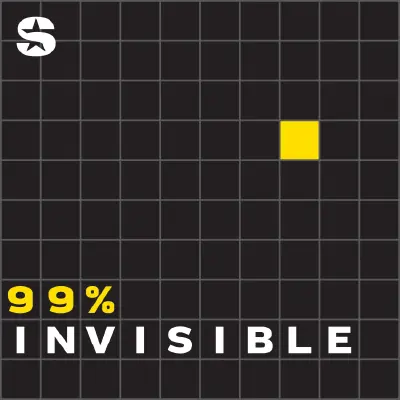
99% Invisible
727 episodes Last Updated: Jun 10, 25
Design is everywhere in our lives, perhaps most importantly in the places where we've just stopped noticing. 99% Invisible is a weekly exploration of the process and power of design and architecture. From award winning producer Roman Mars. Learn more at 99percentinvisible.org.
Episodes
Jun 10, 2025
The Return of Con Law
We heard you. The chorus of voices asking “where is Con Law? Where is Professor Elizabeth Joh to guide us through this madness? We need it now more than ever!” Well, here it is. We’re back with a special extra-long episode about Trump’s perverted use of the Alien Enemies Act to deport people without due process and how judges are trying to hold the administration accountable to the Constitution.Plus, we announce the launch of The 99% Invisible Breakdown: The Constitution, where Elizabeth and Roman will tackle a different section of this 7600-word document each month, treating the Constitution as a text to be analyzed.The Return of Con Law
Subscribe to SiriusXM Podcasts+ to listen to new episodes of 99% Invisible ad-free. Start a free trial now on Apple Podcasts or by visiting siriusxm.com/podcastsplus.
Jun 03, 2025
Adapt or Design
A debilitating injury forces 99PI's Kurt Kohlstedt to confront new everyday challenges and seek out accessible design solutions for one-handed living.The full set of Adapt or Design articles can be found at 99pi.org/adapt.Adapt or Design
Subscribe to SiriusXM Podcasts+ to listen to new episodes of 99% Invisible ad-free. Start a free trial now on Apple Podcasts or by visiting siriusxm.com/podcastsplus.
Why is it so hard to build anything in America? Ezra Klein explores how our good intentions led to a system that stifles progress, and what it would take to break free.Abundance by Ezra Klein and Derek ThompsonBuild, Interrupted: A Conversation with Ezra Klein
Subscribe to SiriusXM Podcasts+ to listen to new episodes of 99% Invisible ad-free. Start a free trial now on Apple Podcasts or by visiting siriusxm.com/podcastsplus.
May 20, 2025
Foreign in a Domestic Sense
A dusty surveillance file uncovers the story of love, betrayal, and the fight for Puerto Rico’s freedom.Foreign in a Domestic Sense
Subscribe to SiriusXM Podcasts+ to listen to new episodes of 99% Invisible ad-free. Start a free trial now on Apple Podcasts or by visiting siriusxm.com/podcastsplus.
May 13, 2025
Fishing In The Night
Shortwave radio opened a portal to the world—then became a weapon in a high-stakes war of propaganda and power.The Divided Dial is a podcast series about the history of radio from WNYC's On the Media and longtime 99PI contributor, Katie Thornton.Fishing in the Night
Subscribe to SiriusXM Podcasts+ to listen to new episodes of 99% Invisible ad-free. Start a free trial now on Apple Podcasts or by visiting siriusxm.com/podcastsplus.
May 06, 2025
😅⚖️
A single 👍 emoji sent over text was meant to say “got it”—but instead, it kicked off a $62,000 legal battle and raised the question: can an emoji seal a contract?😅⚖️
Subscribe to SiriusXM Podcasts+ to listen to new episodes of 99% Invisible ad-free. Start a free trial now on Apple Podcasts or by visiting siriusxm.com/podcastsplus.
Apr 29, 2025
Changing Stripes Revisited
At the January 6th Capitol insurrection, rioters waved Confederate, MAGA, and Trump-as-Rambo flags. Easy to miss without knowing the design was a bright yellow flag with three red stripes — the flag of South Vietnam.There were actually several confounding international flags present at the Capitol riot that day: the Canadian, Indian, South Korean flags, all were spotted somewhere in the mayhem. But what was peculiar about the Vietnamese flag being there was that it's not technically the flag of Vietnam but the Republic of Vietnam, a country that no longer exists. And what this flag stands for (or should stand for) remains a really contentious issue for the Vietnamese American community.This episode originally aired in 2021.Changing Stripes
Subscribe to SiriusXM Podcasts+ to listen to new episodes of 99% Invisible ad-free. Start a free trial now on Apple Podcasts or by visiting siriusxm.com/podcastsplus.
Apr 22, 2025
One-Nil to the Arsenal
A goofy Shakira remix, a nervy penalty kick, and 60,000 fans turning banter into legend—welcome to the world of football chants.One-Nil to the Arsenal
Subscribe to SiriusXM Podcasts+ to listen to new episodes of 99% Invisible ad-free. Start a free trial now on Apple Podcasts or by visiting siriusxm.com/podcastsplus.
Apr 15, 2025
I've Got 1099 Problems...
If you're one of the millions of Americans struggling with your tax forms today, you're not alone. Even Albert Einstein allegedly found income taxes to be "the hardest thing in the world to understand." But how did our tax system become so complicated?I've Got 1099 Problems...
Subscribe to SiriusXM Podcasts+ to listen to new episodes of 99% Invisible ad-free. Start a free trial now on Apple Podcasts or by visiting siriusxm.com/podcastsplus.
Apr 08, 2025
Everything Is Tuberculosis
John Green uncovers how the world’s deadliest curable disease still thrives—and why everything, from cowboy hats to colonial borders, traces back to tuberculosis.Everything Is Tuberculosis
Subscribe to SiriusXM Podcasts+ to listen to new episodes of 99% Invisible ad-free. Start a free trial now on Apple Podcasts or by visiting siriusxm.com/podcastsplus.